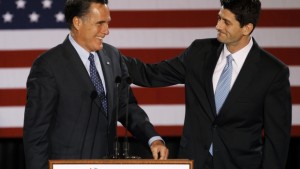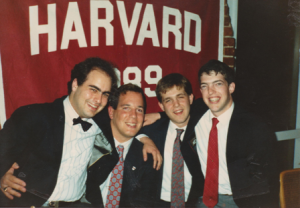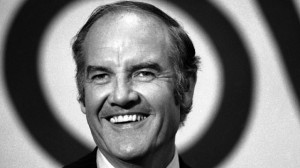By Artur Davis, on Mon Oct 29, 2012 at 10:00 AM ET  If it turns out the life of Barack Obama’s presidency is measured in months, left-leaning analysts will agonize over what went so wrong. Their explanations will range from confusion over how a stunningly gifted orator never mastered the greatest national pulpit, to consternation about the intransigence of Republicans and the eruption of the Tea Party, to sober hand-wringing about the intractable nature of 21st Century democracy. If it turns out the life of Barack Obama’s presidency is measured in months, left-leaning analysts will agonize over what went so wrong. Their explanations will range from confusion over how a stunningly gifted orator never mastered the greatest national pulpit, to consternation about the intransigence of Republicans and the eruption of the Tea Party, to sober hand-wringing about the intractable nature of 21st Century democracy.
But the mourning will not match the genuine misery and perplexity many Americans feel regarding the state of the nation. For all the explanations of how Obama has fallen short of his promise, the simplest one is in the discontent of those 23 million plus individuals who are under or unemployed, some for such long stretches that they have fallen through the cracks of the government’s official statistics. These men and women are the source of a national fury over why things are the way they are, and they and the Americans who know them have proved resistant to deflecting responsibility or changing the subject.
 To be sure, as his defenders never cease to point out, Obama was greeted with the debris of a national calamity. The country seemed to be teetering on the edge of depression for stretches in late 2008 and early 2009, a casualty of a Washington environment that privileged and made unaccountable the giant government sponsored housing enterprises and a reckless Wall Street culture that took the risk out of lending for the mortgagor. But rather than tackle the crisis with single-mindedness, Obama veered off in too many scattered directions: a stimulus whose legacy is a slew of poor returns on investments in alternative energy and uncompleted construction projects, a partisan healthcare law that drained off a year of the administration’s efforts, a massive overhaul of the carbon producing economy that was too unwieldy for even many Democrats to embrace, a financial industry bill that has not stopped excessive leveraging in the capital markets. The portfolio is one that Obama and his allies have strained to explain, much less justify. To be sure, as his defenders never cease to point out, Obama was greeted with the debris of a national calamity. The country seemed to be teetering on the edge of depression for stretches in late 2008 and early 2009, a casualty of a Washington environment that privileged and made unaccountable the giant government sponsored housing enterprises and a reckless Wall Street culture that took the risk out of lending for the mortgagor. But rather than tackle the crisis with single-mindedness, Obama veered off in too many scattered directions: a stimulus whose legacy is a slew of poor returns on investments in alternative energy and uncompleted construction projects, a partisan healthcare law that drained off a year of the administration’s efforts, a massive overhaul of the carbon producing economy that was too unwieldy for even many Democrats to embrace, a financial industry bill that has not stopped excessive leveraging in the capital markets. The portfolio is one that Obama and his allies have strained to explain, much less justify.
Read the rest of…
Artur Davis: A Closing Argument for Mitt Romney
By Ronald J. Granieri, on Sun Oct 28, 2012 at 8:30 AM ET As the late night comics and cable screaming heads continue to mock and skewer the small percentage of undecided voters who will tip the balance in next week’s presidential election — How can someone be so stupid as to not be able to tell the difference between the two candidates? — I learned that one of the smartest people I’ve ever met is among this derided consitituency.
Ron Granieri is a graduate of Harvard College, earned his PhD in History from the University of Chicago, and has served as a professor at an Ivy League university. Moreover, as a precocious college student — who happened to be my roommate — Ron’s near photographic memory would enable him to beat me at Trivial Pursuit without ever allowing me a turn.
I’ve asked Ron to share with the RP Nation the path of a Reagan acoloyte who became frustrated with the far right turn of the GOP, only to be later disenchanted with the promise of the Obama Administration.
Because it will be voters like Ron who could ultimately determine our next President.
– The RP
= = = =

When The RP approached me the other day to ask me to join in the round table of “closing statements” for one candidate or another in the presidential election, it forced me to confront something I have tried to avoid for many months.
We have all seen the skits and made the jokes about undecided voters. Saturday Night Live mocked them for being ignorant. [Watch the video at the bottom of this post — in which an undecided voter asks whether French kissing could lead to pregnancy.] The brilliant Steven Colbert recently took it even further, comparing the elusive undecided voter to Jodie Foster’s epically (if unintentionally) hilarious backcountry wild child, Nell.
I have enjoyed a few chuckles at these images myself. But deep down I have been hiding a shameful secret: I am one of them.
I never thought it would come to this.
 Ron’s childhood idol I have always been politically curious, going back to my childhood when I talked politics with my extremely political father. I can remember telling him I thought President Nixon should resign during the summer of 1974 (I was 7). By the time I was in high school in the early 1980s, I had become, following in the intellectual footsteps of my childhood idol, William F. Buckley, Jr., an enthusiastic conservative. My father, who admired Buckley in spite of rather than because of his ideology, was not completely happy about that, but he respected my positions, and we had some wonderfully spirited arguments. When the Georgetown School of Foreign Service application requested an essay outlining the one international problem I would most like to address in my future career, I wrote a perfervid essay on the need to combat international communism. No copy of the essay survives from that pre-word processing age, unless it is in a Georgetown archive somewhere, but I well remember being proud of calling communism “an international gangrene that threatens the health and safety of every society it touches.” I wonder what the folks at the Walsh School thought of it. I don’t know if it helped or not, but I did get in, even if I ended up going somewhere else.
In college I became one of the most visible conservatives on campus, editing Harvard’s monthly conservative student paper, the Salient. It culminated in my being featured in a full page of the graduation issue of the Crimson in 1989, as one of a handful of notable graduates of my class. That article, I discovered, is still available online, but when I think of it I think of the yellowing clipping that my mother framed and hung on the wall in what used to be my bedroom in Niagara Falls.
 Graduation Day: Ron at far left, The RP, second from right I had opinions on everything back then. Some of them I still hold; some I do not. A few of them make me shake my head in affectionate embarrassment for a young man who was awfully full of himself. Nevertheless, I had a pretty clear sense of where I stood on things; I voted in every election I could, and my votes followed those convictions. It was not always easy to be the most conservative person in the room (an experience that followed me from college to graduate school to at least the start of my academic career). But it worked well thanks to lots of good friends and plenty of mutual good will and respect for differences.
 In 88, Ron supported Bush 41, but teen hooligans made him a sleeping billboard for the liberal Dukakis Gradually, however, my sense of having a clear political home began to shift. Part of it was seven years living in the wonderful state of South Carolina, birthplace of both Steven Colbert and Strom Thurmond. In the final years of the last century and the early years of this one, I saw a Republican party that became increasingly focused on issues that did not appeal to me. On the local level I saw a rising tide of anti-intellectualism, anti-urbanism, and nativism. The national party displayed those traits as well, but mostly became fixated on slashing taxes, and too often responded to serious discussions about how to provide enough revenue for existing programs with vaguely neo-Confederate rhetoric about shrinking government disconnected from political reality. It was the party of the suburbs, of the Sun Belt and the Evangelicals. None of those traits much appealed to me, an Italian-Irish Catholic intellectual from a Rust Belt industrial town who prefers Alexander Hamilton to Thomas Jefferson and believes the Good Guys indisputably won The War of the Rebellion. The Cold War conservatism that I had embraced so closely, with its sense of national purpose, was dying out, and the new individualized Right was leaving me cold.
I remember well the moment when I really felt that things were slipping away. It was in spring 2000, on the eve of the South Carolina primary. I answered the phone and it was someone from the George W. Bush campaign team taking a poll. She was very pleasant, asked me if I had decided whether to vote for Bush or John McCain, and I admitted I was thinking it over. She then launched into a critique of McCain that trumpeted Bush’s plans for immediate tax cuts that would give the budget surplus back to the voters. I responded that I liked a lot of things about Governor Bush’s “compassionate conservatism,” which I took to mean conservatism based not simply on individualism but which included a sense of shared community responsibility. At the same time, I told her I did not really think that it made sense to rush to cut taxes when we still had a national debt in the trillions. (This was even before Afghanistan, Iraq, Medicare Part D and TARP, of course.)
An embarrassed pause followed. Then she curtly thanked me for my comments and hung up.
I should have taken that as a clear sign of where the Bush campaign stood and where my concerns fit into that agenda. But breaking up is hard to do. Even as I felt increasingly alienated from the GOP, it continued to get my votes. At least, that is, until 2008, when my frustration with the party and where it had led the country moved me to turn my back on them and vote for Barack Obama.
There, I said it. College friends may need a moment. I’ll wait. I recommend deep breaths.
Read the rest of…
Ron Granieri: I’m An Undecided Voter — And Yes, I Know How Babies Are Made
By Jonathan Miller, on Sun Oct 28, 2012 at 8:15 AM ET Despite being a proud, progressive Obama supporter, I frankly found the Lexington Herald-Leader‘s decision to run a minority view editorial on the presidential race refreshing. Allowing your readers to have both sides and then decide on their own is a good policy, one that is at the core of The Recovering Politician.
However, I am confused by a statement made within the minority editorial (linked here) that said Publisher Rufus Friday “chose not to use his power as publisher to overrule the majority.”
I’m confused because just a few inches below the editorial sits the editorial board policy which states that “Herald-Leader editorials are the consensus of the editorial board” of which the publisher is but one of 5 members.
Does the publisher always reserve the right to overrule the other 4 members? If so, will that be disclosed in the circumstance that he does? Is this a new policy or is this just the first time I was aware of it?If anyone knows the answers, please comment below. Thanks!
By John Y. Brown III, on Fri Oct 26, 2012 at 12:00 PM ET  Warning! I now know what Hell looks like—and I am never carrying a rolled mat. It could be a sign of my future. Warning! I now know what Hell looks like—and I am never carrying a rolled mat. It could be a sign of my future.
I recently walked in on a hot yoga class breaking up. I didn’t know what it was at the time and my mind went into overdrive, trying to figure out what these people were doing. They were stripped down as far as they could be in public, sweat was excreting from ever pore in their body, they looked pained and exhausted and dispirited and some even were moaning with exhaustion. They appeared to be part of a group exercise that morning in Hades rolling the Sisyphus stone together up a hill.
I figured they were on some sort of smoke break from Hell. Except none were smoking….and actually looked pretty healthy.
 But they all carried these eerie looking rolled devices (see below). It looked like a rolled mat but apparently is for self-flagellation and required packing for the Underworld. Do not be caught carrying one of these in public! And avoid others who do!
By Jonathan Miller, on Fri Oct 26, 2012 at 9:15 AM ET As you may have noticed, we are only 11 days away from what some call the most important presidential election of our era.
OK, they say that every 4 years…but it is certainly clear that the American people are being offered two highly contrasting visions of the nation’s future.
This week, Barack Obama and Mitt Romney are offering their closing arguments to the American people — summations of why they have earned your vote.
That’s why we are dedicating a week at The Recovering Politician to Campaign 2012: The Closing Argument. Over the course of the week, a dozen of our contributors — of course, representing both sides of the aisle — will be making their own summations for the candidate of their choice.
And you can, too. We are calling on the RP Nation to join in as well. Send us a closing argument for your presidential candidate — Obama, Romney, or a 3rd party candidate if you prefer. If it is only a paragraph or two — or just one strongly worded sentence — feel free to leave it in the comments section below. If it is longer — up to a maximum of 1000 words — you can email it to Staff@TheRecoveringPolitician.com. To ensure its publication, please send it to us by Noon, Thursday, November 1.
And who knows, maybe a campaign staffer picks up your ideas, shares it with the candidate, and you will have changed the course of American history. Or perhaps you just get a kick sharing your thoughts with thousands of other readers across the country.
Either way, we’d love you to join us.
By Artur Davis, on Fri Oct 26, 2012 at 8:30 AM ET  The eulogies for George McGovern, who just died at 90, have taken a predictable form: plaudits from the left for his inspirational effect on a class of aspiring liberal politicos combined with an acknowledgment that he was a singularly ineffective, disastrous candidate whom the same left never needed or cared to rehabilitate. To be sure, the evidence of McGovern’s incompetence and irrelevance is a narrative that Democratic analysts have had their own reasons to spin over the last two generations. It can’t possibly be, so the conventional wisdom goes, that a 49 state loser who spectacularly blundered the selection of a running mate and who is still synonymous with epic loss, was much more than an incidental character in a decade of unusual turbulence. And if McGovern’s legacy is just ineptitude, it is easier to dismiss him as a blip, an anomaly, in the liberal tradition. The eulogies for George McGovern, who just died at 90, have taken a predictable form: plaudits from the left for his inspirational effect on a class of aspiring liberal politicos combined with an acknowledgment that he was a singularly ineffective, disastrous candidate whom the same left never needed or cared to rehabilitate. To be sure, the evidence of McGovern’s incompetence and irrelevance is a narrative that Democratic analysts have had their own reasons to spin over the last two generations. It can’t possibly be, so the conventional wisdom goes, that a 49 state loser who spectacularly blundered the selection of a running mate and who is still synonymous with epic loss, was much more than an incidental character in a decade of unusual turbulence. And if McGovern’s legacy is just ineptitude, it is easier to dismiss him as a blip, an anomaly, in the liberal tradition.
 But the theory of McGovern as a woeful bumbler has always shortchanged two features of the South Dakotan: the first is the novelty of the liberalism that McGovern helped foist on the Democratic Party in the early seventies, and the second is its durability in a party that putatively disowned him while absorbing most of his ideological sensibilities. But the theory of McGovern as a woeful bumbler has always shortchanged two features of the South Dakotan: the first is the novelty of the liberalism that McGovern helped foist on the Democratic Party in the early seventies, and the second is its durability in a party that putatively disowned him while absorbing most of his ideological sensibilities.
To grasp the novelty, it’s worth noting what post-war liberalism was prior to McGovern’s insurgency: a populist sounding, rhetorically lofty politics that had a transactional, anything but radical reality at its core. Adlai Stevenson was more of a trimmer on school desegregation than Eisenhower era Republicans. John Kennedy and Lyndon Johnson pursued conventionally growth oriented economic policies with tax cuts and balanced or near balanced budgets at the centerpiece. The Great Society’s vaunted anti-poverty initiatives were invariably complements to urban political machinery, as Geoffrey Kabaservice documents in his work on the erosion of moderate Republicans, “Rule and Ruin”. Hubert Humphrey disavowed interpretations of the Civil Rights Act of 1964 that endorsed mandatory hiring goals for minorities. And on foreign policy, the liberal vision was enamored enough of American power that Robert Kennedy’s announcement of his presidential candidacy styled the campaign as a contest to claim the “moral leadership of the planet”, even while pledging to wind down the conflict in Vietnam.
Read the rest of…
Artur Davis: McGovern Lives
By Jonathan Miller, on Thu Oct 25, 2012 at 3:00 PM ET As always, Nate Silver cuts through all of the conflicting poll data and screaming head spin to give a true snapshot of the race as it stands today. Here’s an excerpt:
The term “momentum” is used very often in political coverage — but reporters and analysts seldom pause to consider what it means.
Let me tell you what I think it ought to mean: that a body in motion tends to stay in motion. That is, it ought to imply that a candidate is gaining ground in the race — and, furthermore, that he is likely to continue to gain ground.
As a thesis or prediction about how polls behave, this notion is a bit dubious, especially in general elections. In races for the United States Senate, for instance, my research suggests that a candidate who gains ground in the polls in one month (say, from August to September) is no more likely to do so during the next one (from September to October). If anything, the candidate who gains ground in the polls in one month may be more likely to lose ground the next time around.
(Where might there be clearer evidence for momentum, as I’ve defined it? In primaries, especially when there are multiple candidates in the race and voters are behaving tactically in choosing among them. But there is little evidence of it in general elections.)
The way the term “momentum” is applied in practice by the news media, however, it usually refers only to the first part of the clause — meaning simply that a candidate has been gaining ground in the polls, whether or not he might continue to do so. (I’ve used this phrasing plenty of times myself, so I have no real basis to complain about it.)
But there are other times when the notion of momentum is behind the curve — as it probably now is if applied to Mitt Romney’s polling.
Mr. Romney clearly gained ground in the polls in the week or two after the Denver debate, putting himself in a much stronger overall position in the race. However, it seems that he is no longer doing so.
Click here to read the full article.
By John Y. Brown III, on Thu Oct 25, 2012 at 12:00 PM ET
 The Pinterest Principle. The Pinterest Principle.
Want to have many interests?
Wade into the pool. And keep going.
My daughter persuaded me to join Pinterest tonight so I did. It’s a website where you select things you like —a sort of personality and style social medium.
At first because it was awkward and new, I was extremely selective and hardly “liked” anything.
But once I waded in and got comfortable with Pinterest, I started liking everything.
In fact, there was little I didn’t like!
Lesson?
Hobbies and interests aren’t a function of our curiosity or tastes or temperament. They are essentially a matter of getting comfortable in our environment.
Once that is accomplished the world becomes a friendlier place with much about it to like.
At least that’s my pet theory for the day. ; )
By Zack Adams, RP Staff, on Thu Oct 25, 2012 at 10:00 AM ET The Politics of Tech
Windows 8, the newest operating system from Microsoft, is being released this week. Are you interested in checking out an early review? Here’s one. [The Verge]
Sony has announced a 20-inch 11 lb. tablet. It looks like the base model will put you back $879. [Geek.com]
This is the coolest robot design ever. [YouTube]
Game developer Zynga laid off more than 100 employees this week as the companies value continues to drop. The timing of the lay offs was interesting as they chose to make the announcement during Apple’s event revealing the iPad Mini. [Tech Crunch]
There has been at least one ruling on the multi-touch patent controversy – this week a Dutch court ruled that Samsung did not infringe on Apple’s patent. [Reuters]
By Josh Bowen, on Thu Oct 25, 2012 at 8:30 AM ET “Our deepest fear is not that we are inadequate. Our deepest fear is that we are powerful beyond measure. It is our light, not our darkness that most frightens us. We ask ourselves, Who am I to be brilliant, gorgeous, talented, fabulous? Actually, who are you not to be? Your playing small does not serve the world. There is nothing enlightened about shrinking so that other people won’t feel insecure around you. We are all meant to shine, as children do. It’s not just in some of us; it’s in everyone. And as we let our own light shine, we unconsciously give other people permission to do the same. As we are liberated from our own fear, our presence automatically liberates others.”
 Let’s think about the quote above. What is separating all of us from achievement? Is it us? Could it be that we are actually afraid of accomplishing what we set out to do? Let’s think about the quote above. What is separating all of us from achievement? Is it us? Could it be that we are actually afraid of accomplishing what we set out to do?
Bingo!
I have a lot of experience in training and motivating others, not just in fitness but in life. I have always had a sense that deep down people are not afraid of failure but rather afraid of achieving. When you achieve something people will expect you to do the same every time. This adds responsibility and adds the component of hard work. Now, don’t get me wrong I am not calling out people, talking about how lazy they are. Quite the contrary, I am saying that in our subconscious we have a deep fear that we CAN accomplish any and every thing that we set out to do.
So how do I perform reverse psychology on myself?
Here is the deal the first step to accomplishing anything is you have to believe it is possible. Here is an example; people once thought that running a mile in under 4 minutes was impossible. It wasn’t until 1954 that Roger Bannister broke the 4 minutes barrier, running a mile in 3 minutes and 59 seconds. 42 days later another man ran a mile in 3 minutes and 58 seconds. Fast forward to present day and the world record for the mile has lowered 17 seconds and now running a mile in under 4 minutes is the STANDARD by which all middle distance runners are judged.
Do you see what happened there? Once one person did it, everyone else knew it was possible. You think that you are the only person in the world sitting there at your computer, reading this article with 50, 60, 70, 100 pounds to lose. The reality of it is people are doing it every day and so can you! All you have to do is believe.
Read the rest of…
Josh Bowen: Motivation
|
The Recovering Politician Bookstore
|
 If it turns out the life of Barack Obama’s presidency is measured in months, left-leaning analysts will agonize over what went so wrong. Their explanations will range from confusion over how a stunningly gifted orator never mastered the greatest national pulpit, to consternation about the intransigence of Republicans and the eruption of the Tea Party, to sober hand-wringing about the intractable nature of 21st Century democracy.
If it turns out the life of Barack Obama’s presidency is measured in months, left-leaning analysts will agonize over what went so wrong. Their explanations will range from confusion over how a stunningly gifted orator never mastered the greatest national pulpit, to consternation about the intransigence of Republicans and the eruption of the Tea Party, to sober hand-wringing about the intractable nature of 21st Century democracy. To be sure, as his defenders never cease to point out, Obama was greeted with the debris of a national calamity. The country seemed to be teetering on the edge of depression for stretches in late 2008 and early 2009, a casualty of a Washington environment that privileged and made unaccountable the giant government sponsored housing enterprises and a reckless Wall Street culture that took the risk out of lending for the mortgagor. But rather than tackle the crisis with single-mindedness, Obama veered off in too many scattered directions: a stimulus whose legacy is a slew of poor returns on investments in alternative energy and uncompleted construction projects, a partisan healthcare law that drained off a year of the administration’s efforts, a massive overhaul of the carbon producing economy that was too unwieldy for even many Democrats to embrace, a financial industry bill that has not stopped excessive leveraging in the capital markets. The portfolio is one that Obama and his allies have strained to explain, much less justify.
To be sure, as his defenders never cease to point out, Obama was greeted with the debris of a national calamity. The country seemed to be teetering on the edge of depression for stretches in late 2008 and early 2009, a casualty of a Washington environment that privileged and made unaccountable the giant government sponsored housing enterprises and a reckless Wall Street culture that took the risk out of lending for the mortgagor. But rather than tackle the crisis with single-mindedness, Obama veered off in too many scattered directions: a stimulus whose legacy is a slew of poor returns on investments in alternative energy and uncompleted construction projects, a partisan healthcare law that drained off a year of the administration’s efforts, a massive overhaul of the carbon producing economy that was too unwieldy for even many Democrats to embrace, a financial industry bill that has not stopped excessive leveraging in the capital markets. The portfolio is one that Obama and his allies have strained to explain, much less justify. 
















